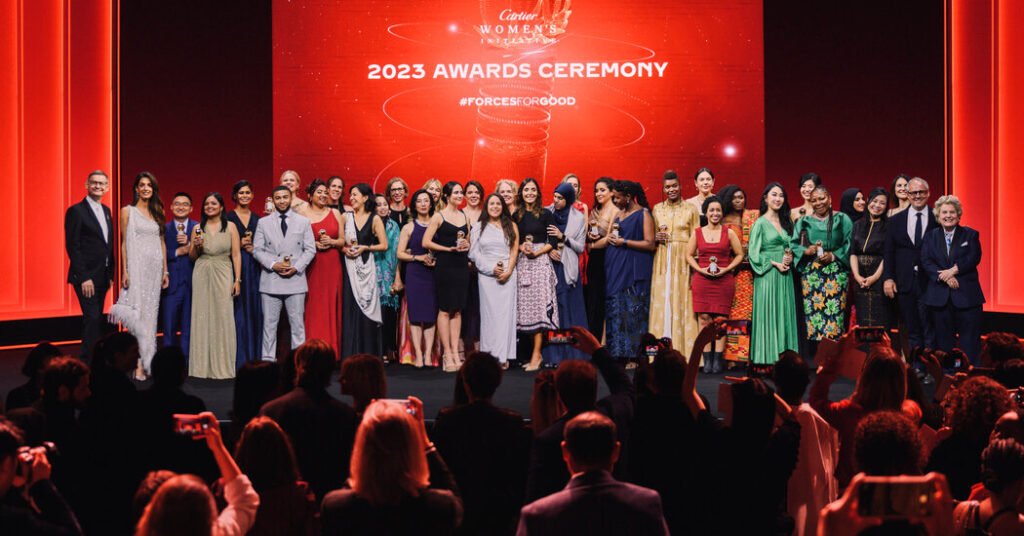Since 2006, Cartier has supported women entrepreneurs whose businesses have a positive impact on society and the environment.
Cartier, the Richemont-owned jewelry brand, is doing this through a program called the Cartier Women’s Initiative. The initiative provides women-owned or women-led businesses in all sectors with grants, networking opportunities, financing and expert advice to help overcome barriers such as lack of funding or access.
Until last year, the program focused exclusively on women. But in 2023, Cartier invited men to join its ranks. Cartier has introduced a new Diversity, Equity and Inclusion Pilot Award to its program that recognizes entrepreneurs whose businesses advance opportunities for underrepresented groups, regardless of gender.
According to Cartier, when the Pilot Award was announced last year, 70 executives applied, of which 80% were women and 20% were men. (Cartier does not disclose the number of applicants for the program as a whole.) This year, the number of applicants in the DEI awards category increased to 83 people, 20% of whom were men.
Cyrille Vigneron, Cartier’s president and chief executive officer since 2016, said: “DEI categories have been expanded to include gender, social background, religion, and national origin, as everyone may face difficulties in accessing them. “We believe it should be open to all people, regardless of their size or sexual orientation.” he spoke by phone from Geneva. “Our aim is to create a sense of belonging in a more inclusive world.”
Winsy Sampaio, global program director for the Cartier Women’s Initiative, said recently in Paris that she is looking for “companies that are solving inclusion challenges” in the DEI category.
“Typically, these entrepreneurs choose problems based on their own life experiences that inspired them to create solutions for change,” Sampaio said. “If they are left out of the entrepreneurship ecosystem, I don’t think those solutions will emerge.”
This new category reflects how the Cartier Women’s Initiative has evolved and how it is countering the growing trend among business leaders to retreat from DEI programs.
Mr. Vigneron is the driving force behind this effort. When the program started in 2006, it was a business plan competition held as part of the Women’s Economic and Social Forum. But in 2017, Vigneron made it an independent program and has since awarded more than $9.5 million in grants to nearly 300 entrepreneurs in 60 countries.
“I am a feminist,” Vigneron said in a speech at the initiative’s awards ceremony in Paris last year to an audience that included human rights lawyer Amal Clooney, who also spoke.
“We have the power to liberate women from stereotypes,” Vigneron said in an interview last month. “But we must also encourage men to free themselves from their stereotypes and respectfully become who they want to be.”
“The initiative today is an independent organization because of the larger commitment on the part of Cartier and the strong traction we have experienced in all the regions we cover,” he said.
To determine the program’s winners, a jury of businesspeople will select three fellows for first, second and third place in 11 different categories. One of them is her DEI. These finalists will receive grants of $100,000, $60,000, or $30,000 and other benefits.
Last year, two of the top three awards in this category went to men.
The top award in this category went to Blake Van Putten, CEO of CISE, a Los Angeles-based fashion house that sells products designed to empower the Black community. The best seller is a vegan leather handbag embossed with the words “Protect Black Women,” which retails for $150.
“After the murder of George Floyd, I felt like I wasn’t doing enough for the black community,” Van Putten said recently by phone from Los Angeles.
Third place was awarded to Chengchuan Shi, founder and CEO of Voibook Technology, Guangzhou, China. Mr Shih, who lost his hearing at the age of 11 due to an illness, uses an artificial intelligence-based platform to help deaf people who don’t know sign language write text or convert the words they type into written text. He founded the company in 2016 to help people communicate. There’s a sound.
Second place went to Ishani Roy, female founder and CEO of Serein Inc. from Bengaluru, India. The firm specializes in strategies and policies to address and prevent sexual harassment in the workplace.
This year, no boys finished in the top three in the DEI category.
The current DEI finalists are Sadriye Gorece, founder of BlindLook, a Bay Area company that has developed an AI-powered audio app to help visually impaired people shop online. Erica Cole, founder of No Limbits, a Richmond, Virginia-based company that makes clothing for people with disabilities. Akshita Sachdeva, whose company Trestle Labs in Bangalore, India, has developed Kibo (‘Knowledge in a Box’), a device that provides visually impaired people with voice access to printed, handwritten and digital content. designed.
The awards will be announced at an awards ceremony to be held in Shenzhen, China on May 22nd.
“Shenzhen is a center of innovation and creativity,” Vigneron said. “We also thought it would be important and interesting to go to China, where there is a very strong community of women entrepreneurs.”

